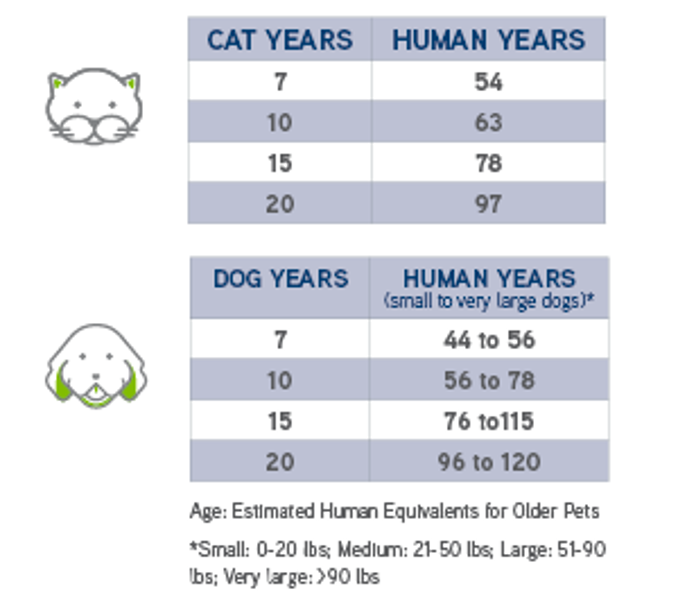With modern veterinary medicine, we are helping pets to live longer. These advances mean we can enjoy our pets being a part of the family longer. But along with longer lifespans, we see more pets develop problems common to aging. For this reason, we want to educate pet parents on caring for a senior pet.
How Old Is My Pet?
A good start is to keep up with the age of your pet and what to expect from their age. For example, here is an age chart for cats and dogs:

Changes to Watch for in Senior Pets
Here are some common changes to expect as your pet ages.
1. Impaired sight and/or hearing
Like humans, it is normal for pets to lose some of their sight and hearing as they age. Older pets can develop cataracts. In regard to their hearing, they may not respond as well to voice commands. But pets usually have a very good sense of smell. They will depend on this more as they age. They will use scents to be familiar with things around them. You can help them by limiting changes to their environment.
2. Arthritis
The most common type of arthritis in pets is Osteoarthritis (degeneration of joint cartilage and the underlying bone). Typical signs of arthritis are difficulty moving or limping. A pet with arthritis may also show irritation when touched or petted (especially over the arthritic areas) and may seem more depressed or grouchy.
Two major contributors to arthritis are a sedentary lifestyle and obesity. To prevent or help alleviate arthritis, it is important to keep your pet at a healthy weight. If your pet is overweight, talk to your veterinarian to ensure you have your pet on the right diet and exercise.
3. Incontinence
Aging pets commonly experience some degree of incontinence, usually urinary. You may notice urine dribbling. Older pets can develop weak pelvic floors or poor bladder tone, which can result in urinary incontinence. However, there are other causes of incontinence such as urinary tract infections. So, if you notice any changes in continence, please give us a call.
4. Dementia
Dementia may not be as common as the other symptoms above but as pets are living longer you should be aware of these symptoms.
Dogs:
- Sleeping more within a 24-hour period.
- Losing interest or becoming apathetic.
- Intermittent anxiety expressed by apprehension, panting, moaning, or shivering.
- Forgetfulness such as forgetting commands, not recognizing objects, no longer being housetrained, and getting stuck behind furniture.
- Becoming overly aggressive.
Cats:
- Disorientation such as failing to recognize people or places at times; getting lost.
- Less interaction with other pets or people.
- Change in sleep habits. May sleep more during the day but wander around more at night often accompanied by crying out for no apparent reason.
- Loss of house-training skills. This could be because they forget where the litter box is and/or have lost interest in keeping themselves clean.
7 Tips for Helping Your Pet as They Age
1. More Frequent Vet Visits.
Yearly checkups are important to keep your pet healthy. However, as pets age, they become more susceptible to diseases and other medical conditions. Often health problems that go undetected can become more serious issues when left untreated, so checkups are important even when your pet appears healthy.
2. Monitor Their Weight.
Pet’s nutritional needs change as they enter different stages of their lives. The best way to make sure your pet’s needs are being met is to consult with us about a diet made specifically for his or her age and lifestyle.
3. Keep Them Exercising.
As your pet ages, adjust their exercise to their abilities. They may have once been able to go on runs with you but now may only be able to tolerate a slower or shorter walk. Whatever physical activity they can manage, keep them at it.
4. Keep their Teeth and Gums Healthy
Most dogs and cats have some degree of periodontal disease by age 3. If left untreated, these patients are at an increased risk for developing heart valve disease and kidney disease. Establishing good oral hygiene habits for your pet is essential in battling periodontal (dental) disease. Dogs and cats also can’t tell us when their mouth hurts. They often stop eating when they need dental care.
5. Help Them with Grooming
As pets get older it can become difficult for them to properly groom themselves. Daily grooming will help their coats stay healthy and is a great way to give them some love and attention too.
6. Adjust Their Environment as Needed.
Some environmental adjustments may be needed as your pet ages and they cannot see, hear, or move as well as they use to.
- Pet stairs or ramps. A pet stair or ramp can help them manage to still get up on your couch or bed and cuddle with you or climb up into their cat tree. Stairs can also help dogs get in and out of your car.
- Secure their environment. Always keep dogs on a leash when they are outdoors. Keep your cat in a secured patio (catio), porch or indoors. There also cat fences available to keep them in safely in your yard.
- Provide them with a comfortable bed. An orthopedic bed or heated bed could make a big difference in their sleeping comfortably and relieving arthritic pain.
7. Alternative Therapies.
We offer acupuncture and laser therapy as alternative therapies for pets. Both treatments can do wonders for a pet who is aging and suffering from arthritis.
Final Words
The above are symptoms you can watch for as your cat or dog ages. They can apply to many exotic animals as well. However, do not try to diagnose your pet yourself. There can be more than one cause for any one of these symptoms. But you can help your pet by observing what is going on with them and giving this data to us so we can accurately diagnose your pet.
The team here at Hammond Vet work with one purpose in mind – to provide the best medicine to help you and your pets to have long and happy lives together. If your pet has not had a checkup at least within the last year, contact us and schedule an exam.
Sincerely,
Your Friends at
Hammond Veterinary Hospital

